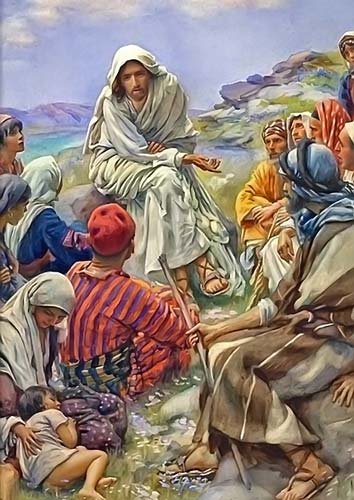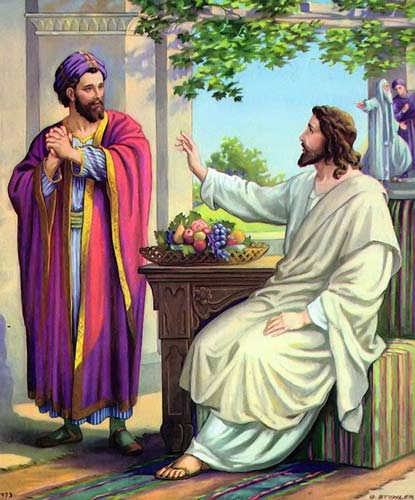Gospel Politics is Liberal (or Radical) Politics!
Please Visit our Very Active Facebook Page for Current News and Discussion:
How's that for a provocative start? Look, this site is all about the two things you aren't supposed to discuss in polite company -- religion and politics. So, if you don't like controversy, then, by all means, you should probably exit this site now. On the other hand, if you like discussing the most important issues of our time, even if they are contentious, then welcome to Gospel Politics.com! Here we go.

Jesus of Nazareth was active in politics. He consistently rebuked the powerful and wealthy for their mistreatment of the poor, sick, hungry and oppressed. Indeed when Jesus began his ministry the first thing he did was proclaim "good news to the poor". In today's terms, if we are honest and reasonable, we have to say Jesus would be considered a liberal politically. [Whether Jesus would vote Democrat is a bit more debatable of course and yes quibbling over the definitions of liberal vs radical labels is warranted.]
Current Hot Topics:How is it that modern "followers of Jesus" somehow have ended up on the side of wealthy and selfish interests; opposed to the interests of the poor, sick, hungry and oppressed on most issues of public policy?
- Trump's Trade War with China
- What Does it Mean to Be Pro-Life?
- The Gospel and the Role of Government
Of course, the gospel is about much more than politics. Yet, its political implications, for the common good, are enormous. Unfortunately, as our political problems have grown larger, the trend has been to shrink the gospel and make it nearly irrelevant to them. This website seeks to help turn that around.
Everyone knows that our nation (the U.S.) and world are in a time of great crisis and turmoil. Unemployment, debt, homelessness, hunger, pollution, global warming, violent weather, poverty and economic inequality are all at record, or near record, levels.
Despite the record wealth produced by our society, and high government spending, we are increasingly unable to pay for good roads, mass transit, teacher salaries, social security, medical care, clean energy, environmental restoration, and other things that would benefit everyone. The bottom line in America today is the rich are doing extraordinarily well; the middle class is struggling; and the poor (as well as God's creation) are hurting.
Yet, the Christian Church is generally silent about these problems. This is strange because, in the bible, God talks more about justice (social, economic and creation) than any other topic. In the gospels, Jesus is recorded talking more about greed, selfishness and oppression of the poor by the rich than anything else.
At various places on this website, we talk about the relevance of the gospel, and what the bible says, about a great many political issues. But, let's start here with, perhaps, the three biggest: economic inequality, health care and global warming.
- Income and wealth inequality has reached unprecedented levels in the world today, especially in the United States. Despite the dreary headlines, the U.S. creates more wealth than any country in the history of the world. We have plenty of money to meet every challenge we face. The problem is virtually all that wealth goes to a few people. The wealthy in America, especially the top .001%, are now incomprehensibly wealthy. Meanwhile, most of the rest of us, the bottom 90%, struggle to make ends meet. The bottom third of our neighbors (about 100 million people) face rampant unemployment, homelessness, hunger and poverty. Despite this inequality, the rich are paying the lowest tax rates they've paid since before the great depression. In fact the average billionaire in America now pays a lower overall tax rate than the many members of the "working poor." And, most proposals on the table today involve the poor and middle class sacrificing still more and the wealthy contributing nothing more. In fact, many politicians openly call for the wealthy to contribute even less! Talk about biblical injustice!!
- Health care spending, by government, industry and individuals is wasted paying for the most expensive and inefficient health care system the world has ever known. Despite the enormous cost, we still leave more people without basic health care than any other developed country in the world. Just one of the harmful effects we suffer from unequal medical care is that we have a higher prenatal death rate than 40 other countries, all of which spend less than us on health care. We could easily spend less, and provide more coverage,through universal, single-payer, health care.
- Global warming is currently killing more people, especially poor people, both born and unborn, than any other problem we face. Unfortunately, due to climate change, it will only get worse. And, the hard truth is that our selfish lifestyle is most to blame for the damage.
You may be asking, so what does the gospel have to do with this?
Good question!
It starts with human nature -- which has both good and bad (sinful even) characteristics. The bad includes our natural selfishness and greed. This sin is the source of all the problems in the world. However, selfishness and greed can, and often is, overcome by believing in and "living out" the gospel of Jesus Christ. Among other things, that means obeying what Jesus identified as the greatest commandments: love God and our neighbors more than ourselves. We obey God in our politics when we work for the common good; when we put the good of the community over the good of our individual selves.
Selfishness and greed are most clearly illustrated in the United States by our tax, spending and environmental policies. The wealthy in America pay an unjustly low tax rate; we spend too much (both government and private sectors) on health care; and we are poor stewards of God's creation. If we will sacrifice for the common good and fix those issues, then our other political problems will be easy to solve. If we can't fix those issues, then nothing else matters -- we'll go bankrupt (economically and spiritually) as individuals and as a country.
From the beginning; from Moses, to the prophets, to Jesus; even into modern times, God's people have been active in politics. Godly men and women have stood against greed and selfishness and stood up for the poor, the sick, the oppressed. Why not now? Why is there no widespread Christian movement demanding fair taxation and health care for all? Why?
The answer is that the "gospel vision" of a great many Christians has been obstructed by an emphasis of the spiritual to the exclusion of the physical. The smaller, weaker gospel commonly preached is almost exclusively about individual, spiritual salvation and has little relevance to the physical world we live in. It has become increasingly popular, perhaps because it makes few requirements on Christians to do anything other than think a certain thought (i.e."believe" in Jesus). Many, maybe most, Christians think the words "gospel" and "salvation" mean the same thing. The truth is that salvation (at least if limited to individual, spiritual aspects) is part of the gospel, but it's not the full gospel.

The full gospel that Jesus preached was big, powerful and all-encompassing. It's the good news that God's Kingdom is breaking through into our spiritual, but also our physical, world; our earth -- now! Jesus invited (and invites) us to be part of the Kingdom of God -- now and for eternity. It's not just a future, spiritual thing. It's also a now, physical thing. This is why citizens of God's Kingdom must work to make this world, God's world, God's creation, a better place for all. A place that looks more like the Kingdom of God.
The gospel, and salvation for that matter, are not just about individual faith. They are also about community, society and doing things. The modern church seems to neglect those aspects of the gospel.
How do we know what to do? Look to Jesus. Be like Jesus. Do the kind of things Jesus did. Adopt the values and worldview that Jesus had. We'll never achieve the perfection Jesus did. Still, to borrow a phrase from popular culture, Christians should be "Jesus freaks," truly. And, if you are wondering what that means, start with understanding that Jesus was (and is) history's greatest friend to the poor, the oppressed, the sick, the homeless, the stranger, the peacemaker, and the minority. Jesus pronounced blessings on the poor and woes on the rich. That's the real Jesus that an over-spiritualized gospel obscures. That's the Jesus we should emulate.
Truthfully, gospel politics are not tough to figure out. Does anyone really think that Jesus would oppose universal health care? Or a just tax system? Or public policies that promote care for God's creation and save the lives of poor people who are most devastated by the global warming? Can anyone doubt that Jesus would be a "liberal" on these issues, and many more, were he here today? Not really.
Yes, one can argue whether the political philosophy of conservatives [Social Darwinism (survival of the fittest)] or liberals ("It Takes a Village") makes better public policy. I think the liberal/progressive view makes the most sense. But, I recognize that reasonable people can disagree about that. However, when it comes to which "world view" is more Christ-like; about that, there really is little doubt. It all comes down to whether one prioritizes the individual or the community.
Of course, the devil is always in the details. And, it's the details, the specific public policies, that too many Christians (and Christian organizations) shy away from even talking about, much less taking action on. Because of this, progress seems to never be made. Living out the gospel requires actually doing things, and in politics that means taking a stand for specific policies. We do.
Given that Christianity is the worlds largest religion and the dominant religion in America -- just imagine what a beautiful world it could be.
I hope you will investigate further the claims made here -- both about the gospel and what the christian response to it should be. In particular, how Christian values should shape the public policies we advocate for. You may well end up disagreeing, but at least you will have made a considered choice. And, be assured, you have ample opportunity to make your voice heard, here. Let's start with What is the Gospel?
 Custom Search
Custom Search